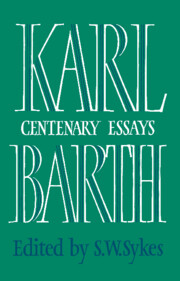Book contents
- Frontmatter
- Contents
- Note on the text
- 1 Introduction
- 2 Karl Barth's eschatological realism
- 3 The triune God and the freedom of the creature
- 4 Authority and openness in the Church
- 5 Ad Limina Apostolorum in retrospect: the reaction of Karl Barth to Vatican II
- 6 The reception of the theology of Karl Barth in the Anglo-Saxon world: history, typology and prospect
1 - Introduction
Published online by Cambridge University Press: 26 February 2010
- Frontmatter
- Contents
- Note on the text
- 1 Introduction
- 2 Karl Barth's eschatological realism
- 3 The triune God and the freedom of the creature
- 4 Authority and openness in the Church
- 5 Ad Limina Apostolorum in retrospect: the reaction of Karl Barth to Vatican II
- 6 The reception of the theology of Karl Barth in the Anglo-Saxon world: history, typology and prospect
Summary
What can a small collection of essays usefully do to commemorate the centenary of the birth of Karl Barth, the most prolific of all the major theologians of the twentieth century? It plainly cannot do justice to the many-sidedness of his achievement; but it can do something to nudge the contemporary discussion of his significance into the more promising of the available channels. One of the major problems in coming to terms with any great thinker is the speed with which the richness and complexity of the original achievement is replaced by the slogans, the ‘isms’ or general terms, which serve to ‘locate’ the phenomenon on some convenient map of the intellectual territory. ‘Barthianism’ was already notorious in Britain and America in the 1930s; ‘dialectical theology’ and ‘Neo-Orthodoxy’ have also lodged themselves as appropriate terms in general histories of the period. Barth himself disliked all these labels; indeed, like Kierkegaard before him, he disliked the very thought of having produced disciples. But it is precisely Barthianism that has become the major obstacle to the intelligent discussion of Karl Barth.
The essays in this volume are all concerned with the kind of dialogue with other systems of thought which would prevent in-house sterility in the debate about Barth. Professor Dalferth insists that Barth must be understood as a kind of philosophical realist, and thus keeps open a debate about Barth's relationship to contemporary philosophy which at least some have all-too-prematurely wanted to close. Barth's attempt to express how the Christian religion understands itself is, so Dalferth argues, capable of quite reasonable defence.
- Type
- Chapter
- Information
- Karl BarthCentenary Essays, pp. 1 - 13Publisher: Cambridge University PressPrint publication year: 1989



